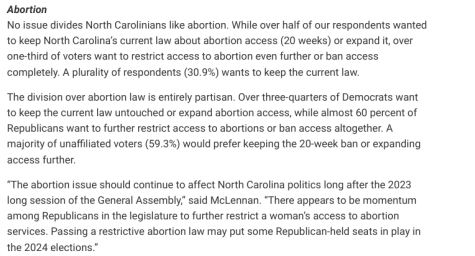New Abortion Restrictions in North Carolina
Pregnant woman holds her belly in autumn colors outdoors. Original public domain image from Wikimedia Commons
June 2, 2023
This past week, the North Carolina Legislature passed a 12-week abortion ban, overriding the veto of Governor Roy Cooper.
Previously, there was no hope of passing this ban, as any legislation would be vetoed by Governor Cooper. But after Rep Tricia Cotham from Mecklenburg County left the Democratic Party for the Republican Party, the dynamic shifted, allowing Republicans to have enough votes to override Cooper.
The 12-week ban originally was passed in May which was possible because of Cotham’s support. Once it was passed, Governor Cooper started aggressively campaigning to prevent a veto-override. He only needed to sway one vote, to prevent the legislation from being passed. This effort targeted more moderate Republicans including Tricia Cotham who, during her election campaign, pledged to oppose further restrictions on abortion. At a rally, with abortion rights supporters Cooper said, “If just one Republican in either the House or the Senate keeps a campaign promise to protect women’s reproductive health, we can stop this ban,”.
Earlier this year, Tricia Cotham from Mecklenburg County had supported a bill that would have legalized abortion until viability (22 to 23 weeks), but then after switching parties, in May she voted in favor of the 12-week ban, and did so again during the override vote. After the vote, she said, “I believe this bill strikes a reasonable balance on the abortion issue and represents a middle ground that anyone not holding one of the two extremist positions can support,”.
She says this bill represents a middle ground as the bill allows abortions up to 12 weeks instead of 6 weeks. They also argue this to be the middle ground because the ban is coupled with millions of dollars in funding for child care, foster care and paid family leave. This funding was added as an attempt to address criticism from abortion rights advocates who say that conservatives ban abortions, but then fail to support mothers and babies.
Republicans have strongly rejected calling the bill a “ban”, even repeatedly asking and interrupting Democrats on the house floor who used the term, asking them to rephrase. North Carolina Senator Amy Galey said, ““A ban is when you can’t do something. ‘Ban’ is a really harsh word.”
The senate voted in favor to override the veto, and the bill was sent to the House. Almost immediately after the House voted to approve the abortion ban at 8:30 pm on May 4th, observers in the House chambers gallery started chanting ““Shame! Shame! Shame!”. Also, following the conclusion of the vote, House speaker Tim Moore said, “I am proud that the House has overridden the governor’s veto of this meaningful, mainstream legislation.”
This abortion ban comes through Senate Bill 20. Senate Bill 20 bans any licensed physician from performing abortions after the 12th week of pregnancy. The law allows exceptions in the case of of rape and incest through 20 weeks. It always provides an exception in the event of a”life-limiting anomaly” through 24 weeks. In addition an abortion could be performed if a doctor determines it is necessary to avoid death, but that does not include “psychological or emotional conditions”.
The ban goes into effect on July 1st, and from there on out, patients will need to meet with their provider in-person, 72 hours before the procedure. This requirement makes it difficult for patients who are seeking care from out-of-state. This is especially detrimental because after the overturning of Roe v. Wade, ⅓ of patients in N.C. who are seeking an abortion came from outside the state.
An important thing to note is that the law allows for any healthcare provider who objects to abortion on “moral, ethical or religious grounds”, to refuse care for “any medical procedure that would result in an abortion”.
Many are opposed to the bill, including many businesses such as Yelp, Lush cosmetics and local Raleigh eatery Death & Taxes. Many businesses including these ones have signed a petition opposing the bill, stating that this legislation would decrease North Carolina’s ability to be a magnet for business. Restricting abortion access can deter businesses from investing here, which can hurt the economy.
Overall, a recent poll showed that most voters (over half) support the state’s current abortion access (allows abortions up to 20 weeks) or want it expanded. A little over a third of voters want to restrict or ban access even more, and about 30% of voters would like to keep the current law.

It seems that abortion access will continue to be put into jeopardy in North Carolina and all across the country, making it an important issue for the 2024 elections.







